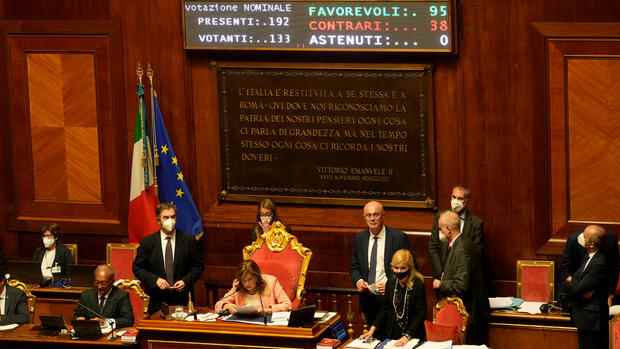At the end of a vote of confidence in the Senate, it becomes apparent that Italy’s Prime Minister Draghi has clearly failed to achieve the broad approval he desired.
(Photo: dpa)
Europe is right to worry about Italy. The third-largest member of the European Union is heading into a “perfect storm”, both politically and economically. This is how EU Economic Commissioner Paolo Gentiloni puts it.
There is a risk of a reform standstill and, after new elections, an unpredictable right-wing government at a time when the country could slip into recession. And all this with a national debt of 150 percent of the gross domestic product in a phase of rising interest rates. The gusts of this perfect storm are likely to be felt across Europe.
It is a core country of the EU. Italy, one of the six founding members of the Coal and Steel Community in 1951, is still a pro-European country. In 2021, a higher proportion of citizens in Italy were satisfied with the EU than in Germany or France.
Every eighth euro of the gross domestic product in the EU is generated in Italy. And Mario Draghi’s influence on Russia policy has shown what Rome can also achieve politically in Europe.
Top jobs of the day
Find the best jobs now and
be notified by email.
But it is also true that this heartland could eventually overwhelm the community’s viability. Italy accounts for almost a quarter of the debt of euro area members. If the country slipped into a financial crisis, that would be much more dramatic than the rescue of Greece.
Consistent resignation Draghi
It is not for nothing that a good 190 billion euros flow from the EU reconstruction fund to Italy, which has been weakened by the Covid pandemic. It is not for nothing that the interest premiums on Italian bonds have been an important factor influencing the European Central Bank’s (ECB) bond-buying policy. It was not for nothing that Mario Draghi, as a beacon of hope in terms of stability and reform, was so popular with other EU countries.
>> Read here: Italy’s Prime Minister Mario Draghi resigns – new elections are imminent
It was an attempt to support Italy from the outside as much as possible. But the self-inflicted domestic political chaos shows that attempts at stabilization have – and should have – their limits.
After three coalition partners let him down in the vote of confidence on Wednesday evening, Draghi’s resignation is consistent. Otherwise he would have been open to blackmail and no longer assertive.
Keeping the unelected prime minister at the head of a unity government that is no longer united would have been undemocratic for reasons of stability without the prospect of new elections.
Italy must implement reforms
Fresh elections could now bring to power a coalition of right-wing parties led by the post-fascist “Brothers of Italy.” At least that’s what current surveys suggest. Concerns about their relationship to Europe, about their willingness and reliability to reform and about their Russia policy are appropriate.
Should the Italian voters nevertheless decide in favor of such a government constellation, the EU and the ECB must be consistent.
Aid for Italy from the EU recovery fund must continue to flow once the promised reforms have been completed. However, if there are delays, the funds should be withheld.
The same applies to the ECB and its bond purchase program. Under no circumstances should these support instruments give Rome the impression that Europe will jump to the country’s side in times of need. That would only lead to even more unstable conditions in the long term.
More: Hello Mario! Bye reforms? That could change in Italy without Draghi
